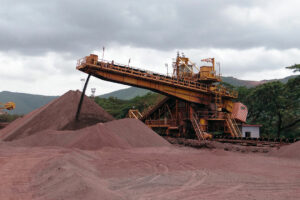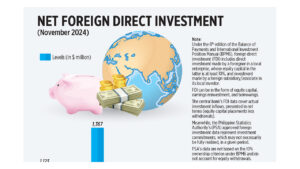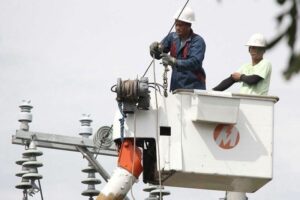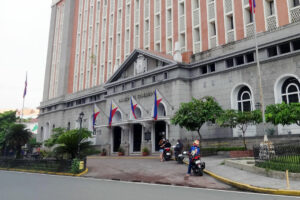Legislator sees mining fiscal regime approval in June after election break

By Kenneth Christiane L. Basilio and Adrian H. Halili, Reporters
A SENIOR legislator said he expects Congress to harmonize the House and Senate versions of the proposed mining fiscal regime.
“We’ll probably meet after the break. It will take just one day, at most,” Albay Rep. Jose Ma. Clemente S. Salceda, who heads the House ways and means committee and is a member of the congressional joint panel that will sit in bicameral conference, told BusinessWorld on Sunday.
“We’ll probably have a ratified version on the same week session resumes,” he added.
Congress went on a four-month break last week for the 2025 midterm elections. It reconvenes for a two-week session beginning June 2, according to the congressional calendar.
The Philippines aims to streamline its fiscal regime for mining to capture a greater share of the industry’s profits. The country is estimated to hold about $1 trillion worth of untapped copper, gold, nickel, zinc, and silver ore reserves.
President Ferdinand R. Marcos, Jr. said in October that rationalizing the mining fiscal regime will create an “equitable” sharing of mining wealth while simplifying the ore and minerals industry’s tax structure to make it more attractive to investors.
Miners’ tax obligations currently vary depending on the companies’ agreements with the government.
Large-scale miners operating within mineral reservations must pay 4% of their gross output, according to House Bill No. 8937, which was approved in September 2023; while the Senate is pushing for a 5% rate.
The House also proposed an eight-tier margin-based royalty regime ranging from 1.5% to 5% and a 10-tier windfall profit tax system ranging from 1% to 10%. Senators are seeking a five-tier margin-based royalty system ranging from 1% to 5% and a windfall profit tax system ranging from 1% to 10%.
“I’m quite happy with both versions. The only principle-based contention is the mineral ore export ban,” Mr. Salceda said, noting that other differing provisions will be resolved via “amicable give-and-take.”
There will likely be a “few rate adjustments” on the proposed tax schedules. He did not elaborate.
The mining industry supports margin-based and windfall profit tax schemes, regardless of which version is adopted, Michael T. Toledo, chairman of the Chamber of Mines of the Philippines (CoMP), told BusinessWorld.
“We can live with the mining fiscal regime provisions of both the House and Senate version. They are nearly identical,” he said via Viber. “This would put the Philippines at par with other mining jurisdictions and ensure a sustainable and vibrant mining industry.”
But Mr. Toledo said a raw ore export ban being proposed in Senate Bill No. 2826 could hurt the Philippines’ attractiveness to investors.
“The raw ore export ban provision in the Senate version… dampens our hopes for a mining tax system that would help boost our country’s viability as an investment destination.”
The government should instead implement an export tax on raw ore instead of imposing an outright ban, according to Mr. Salceda.
“The five-year window in the Senate version is not enough time to develop a real mineral refining capacity,” he said. “On the other hand, an export tax will also help generate revenue for developing the government’s capacity to value minerals the right way.”
He said he’s willing to support “cost-based and performance-based” incentives for domestic refineries to help spur the creation of value-added facilities in the country.
Analysts said miners may not be sufficiently incentivized to put up processing plants despite the overhaul of the tax regime.
“The new mining tax regime should boost earnings for the miners. While the additional earnings from this will hardly be enough to cover the required capital to put up a processing plant, it can at least help a little bit,” AP Securities, Inc. Research Head Alfred Benjamin R. Garcia said via Viber.
He added that the Philippines does not currently have sufficient capacity to process ore.
A mining ban to encourage domestic processing is “a good idea, in principle… However, our concern is that we currently don’t have enough capacity to process (ore),” he said.
Miners typically export raw ore to Japan or China due to a lack of processing infrastructure.
“The Mining Fiscal Regime Bill seeks to make it easier for them to do mining. This is the only compensation we ask for. Ito ’yung kapalit na babalik naman sa tao at hindi lang para sa miners (The condition is that the people get a bigger share of the benefits currently cornered by the miners),” Senate President Francis G. Escudero said in a separate briefing.
Mr. Escudero added that the construction of more ore processing facilities will help bring steel prices down.
Mr. Toledo said he hopes that concerns about an export ban “will be addressed in the unified mining fiscal regime version that will be approved in bicameral session.”
CoMP has also said that mining firms are unlikely to complete the construction of processing plants within the five years stated in the Senate bill.
AP Securities’ Mr. Garcia said that developing the Philippines’ capacity to refine raw ore will take a “large amount of capital and keeping them running uses up a lot of resources like water and electricity.”
Rizal Commercial Banking Corp. Chief Economist Michael L. Ricafort said via Viber that high operating costs could discourage potential processors from investing.
“The bigger picture is the overall cost of operating in the country, especially cost of electricity, given the intensive requirements for power and capital for mineral processing,” Mr. Ricafort added.




